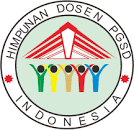PENGARUH PENERAPAN METODE PROBLEM BASED LEARNING DALAM MENINGKATKAN PEMAHAMAN KONSEP DASAR IPS DAN KEMAMPUAN BERPIKIR KRITIS SISWA
Abstract
The influence of Implementation of Methods of Problem Based
Learning to Improve Understanding Basic Concepts of Social Sains and
Critical Thinking Skills Students. The aim of this study is to find out the
influence of problem based learning (PBL) method in enhancing student’s
comprehension of Social Science basic concept and student’s critical thinking ability. This study used quantitative approach with experimental quasi method. The design of study using Nonequivalent Control Groups Design (NCGD). Based on the study result, conclusions are obtained that there is difference in understanding of Social Science basic concept and critical thinking ability between students who taught by using PBL method in
experiment class with students who taught by conventional learning in control class. Thus, students in experiment class understand more about Social Science basic concept from each social science. In addition, the children thought more critical by PBL method, because with PBL requires students more confidence to the results of the facts of the concrete learning of public opinion.
Pengaruh Penerapan Metode Problem Based Learning dalam
Meningkatkan Pemahaman Konsep Dasar IPS dan Kemampuan Berpikir
Kritis Siswa. Tujuan dilakukannya penelitian adalah untuk mengetahui
pengaruh metode problem based learning (PBL) dalam meningkatkan
pemahaman konsep dasar IPS dan kemampuan berpikir kritis siswa. Penelitian ini menggunakan pendekatan kuantitatif dengan metode kuasi eksperimen. Desain penelitian menggunakan Nonequivalent Control Groups Design (NCGD). Berdasarkan hasil penelitian diperoleh kesimpulan bahwa terdapat perbedaan pemahaman konsep dasar IPS dan kemampuan berpikir kritis siswa antara siswa yang memperoleh pembelajaran menggunakan metode PBL pada kelas eksperimen dengan siswa yang memperoleh pembelajaran konvensional pada kelas kontrol. Sehingga siswa pada kelas eksperimen lebih memahami tentang konsep dasar IPS dari masing-masing ilmu sosial. Selain itu, anakanak berpikir lebih kritis dengan metode PBL, karena dengan PBL menuntut siswa lebih percaya kepada hasil fakta-fakta pembelajaran yang konkret dari pada opini public.
Keywords
Full Text:
PDFReferences
Akınoğlu, O. & Ruhan, Ö, T. (2006). The Effects of Problem-Based Learning in Science
Education on Students’ Academic Achievement, Attitude and Concept Learning.
Eurasia Journal of Mathematics, Science & Technology Education, 2007, 3(1), 71-81.
[online]. www.ejmste.com.
Arends, R. I. (2008). Learning to teach. New York: McGraw Hill.
Arends, R. I. & Ann, K. (2010). Teaching for student learning becoming an accomplished
teacher .New York: Routledge.
Baden, M.S. & Major, C. H. (2004). Foundations of problem-based learning. USA: MPG
Books Ltd.
Çimer A., Melih T., & Mehmet K. (2013). Critical thinking level of biology classroom
survey: Ctlobics. The Online Journal of New Horizons in Education, 3(1), pg. 15-24.
Kettler, T. (2014) Critical Thinking Skills Among Elementary School Students: Comparing
Identified Gifted and General Education Student Performance. Gifted Child Quarterly
, Vol. 58(2) 127–136: sagepub.com/journalsPermissions.nav.
Lai, E. R. (2011). Critical Thinking: A Literature Review. Pearson’s Research Reports
Riyanto, Y. (2012). Paradigma baru pembelajaran: sebagai referensi bagi pendidik dalam
implementasi pembelajaran yang efektif dan berkualitas. Jakarta: kencana Prenada
Media Group.
Ruseffendi. E. T (2006). Dasar-dasar penelitian pendidikan dan bidang non eksakta lainnya.
Semarang: IKIP Press.
Sanjaya, W. (2009). Penelitian tindakan kelas. Jakarta: Kencana.
Skeel, D. J. (1995). Elementary social studies; challenges for tomorrow’s world. USA:
Harcourt Brace & Company.
Somantri, M. (2014). Efektivitas penggunaan Model pembelajaran Inkuiri sosial dalam
mengembangkan kemampuan berpikir kritis dan komunikasi sosial anak pada mata
pelajaran ilmu pengetahuan sosial. (Tesis). Sekolah Pascasarjana, Universitas
Pendidikan Indonesia, Bandung.
Sugiyono, (2008), Metode Penelitian Kuantitatif, Kualitatif dan R & D, Penerbit Alfabeta,
Bandung.
Sugiyono. (2013). Metode penelitian pendidikan pendekatan kuantitatif, kualitatif, dan R &
D. Bandung: Alfabeta.
Supardan, D. (2014). Pendidikan IPS, perspektif filosofi, kurikulum dan pembelajaran.
Bandung.
Tan, O. S. (2004). Enhancing thinking through problem-based learning approaches.
Singapore: Cengage Learning.
Tan, O. S. (2009). Problem-based Learning and Creativity. Singapore: Cengage Learning
Woolever, R. M. & Scott. K. P. (1988). Active learning in social studies promoting cognitive
and social growth. USA.
DOI: https://doi.org/10.17509/jppd.v4i1.21301
Refbacks
- There are currently no refbacks.
Copyright (c) 2016 Jurnal Pedagogik Pendidikan Dasar

This work is licensed under a Creative Commons Attribution-ShareAlike 4.0 International License.
indexed By :

_page-0001-min.jpg)






.png)

